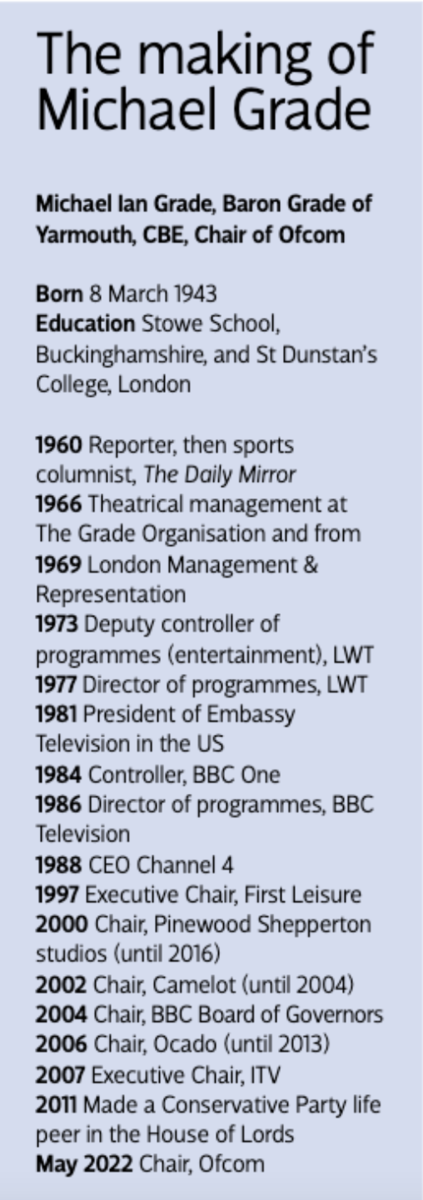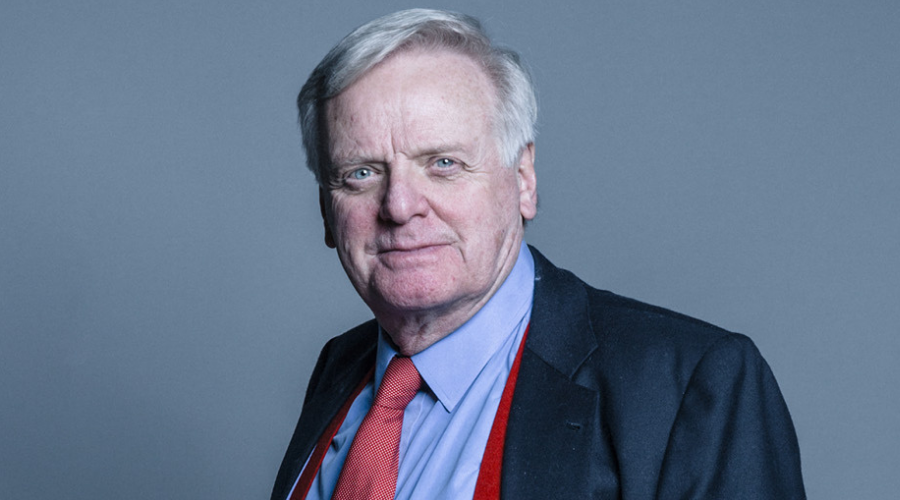Steve Clarke profiles Michael Grade as he prepares to become Ofcom’s new Chair.
If, five years ago, anyone had said that Michael Grade, aka Baron Grade of Yarmouth, would be appointed to chair media regulator Ofcom, the shrieks of incredulity would have been deafening. In his remarkable TV career at ITV, the BBC and especially Channel 4, Grade had been the scourge of regulators.
But these are extraordinary times, and Grade, who was elevated to the House of Lords as a Conservative peer, being hired to run Ofcom seems much less surprising than it once would – especially given the tortuous and protracted nature of the appointment process. Ofcom has been without a Chair since ex-Treasury official Terry Burns stood down in 2020.
Even so, quite how he will adapt to the unique challenges of the three-day-a-week gig is anyone’s guess. “The range of the subject matter is so vast and so detailed, there’s no point in trying to get across the detail because you won’t understand most of it anyway. So you need a Chair who’s going to be realistic about how involved they can be,” said a former Ofcom insider. “I think Michael will get incredibly bored with the essential bits of the job.”
Much of Ofcom’s work is predicated on economic and legal matters. His main expertise is as a broadcaster, albeit an outstanding one. Grade, who was 79 in March, will face a steep learning curve at Ofcom when dealing with non-TV and content-related issues, of which there will be many. Consider the sheer breadth of the regulator’s responsibilities: telecommunications, the digital infrastructure, economic regulation, postal services, even the frequencies used by MI5 and MI6, let alone the watchdog’s new responsibility for the internet.
Moreover, the recent broadcasting white paper adds to Ofcom’s responsibilities. It includes overseeing the new prominence regime, the new VoD code and regulating internet-delivered services.
As a UK broadcaster, Grade’s experience is unmatched, and he can be a highly effective speaker. “His recent performance in the Commons was masterful,” said a TV veteran. A frequent contributor and star turn at RTS events for more than four decades, the nephew of Lew Grade – one of the founders of ITV – began his career in television in 1973 at London Weekend Television. The company was an incubator for a generation of executives who went on to dominate so much of UK TV.
A decade earlier, he had worked as a sports columnist on the Daily Mirror, famously being driven to work on his first day at the office in his father’s Rolls-Royce. The chauffeur dropped him off round the corner from the Mirror’s office so as not to embarrass the young would-be hack with the blood of showbiz royalty running in his veins.
From LWT, Grade, who had adopted his cigar-chomping schtick from Uncle Lew, caused a minor sensation in TV circles when, in 1981, he left Britain to run Embassy Television in Hollywood. Always deeply aware of his own profile, the mogul-in-making drove a pink Cadillac convertible around LA.
Alas, the boulevards of Burbank didn’t quite live up to the hype: two years later, he recrossed the pond to work for the BBC, as controller of a then lacklustre BBC One. With typical chutzpah, he told the press he had taken “the biggest pay cut in history – half a million dollars to £34,000 – I might just have to give up eating”. In the US, he said, he had missed “public service broadcasting, real drama, news, current affairs”.
Revamping the peak-time schedule and promoting a new soap, EastEnders, and a high-profile talk show, Wogan, Grade quickly made his mark at the Beeb. Within two years, he was promoted to director of programmes and, in 1987, was made Managing Director designate for BBC Television.
Then, to the amazement of many, he jumped ship to become Channel 4’s second CEO. This was a highly controversial appointment because Grade was regarded as a populist while Channel 4 shied away from the mainstream.
The populist tag, however, was always an over-simplification. At LWT, he launched The South Bank Show and at the BBC championed the brilliant dramatist Dennis Potter.
‘I’ve spent a lifetime resisting undue political pressure as a broadcaster.… It’s something I’m used to’
Arguably, Grade’s nine years leading Channel 4 represented the height of his TV career. He successfully fought off privatisation and, by canny scheduling, often relying on US imports such as Friends and Frasier, grew the broadcaster’s audience share from 8.4% to 10.6%. Film4 thrived thanks to movies such as The Crying Game.
During his tenure, with attention- grabbing shows such as The Big Breakfast and The Word, the network was never far away from tabloid headlines. All this boundary-pushing led to the Daily Mail’s description of Grade as the country’s “pornographer in chief”. This description upset him hugely.
When he left Channel 4, he did so to head – and dismantle – the sprawling nightclubs-to-gyms empire, First Leisure, then to lead Pinewood and Shepperton studios, become a director of the Millennium Dome and chair Camelot. To many, it seemed as if his TV days were over. But then, in 2004, Grade was appointed Chair of the BBC, where he oversaw the dissolution of its ruling body, the Board of Governors, and replaced it with the BBC Trust.
Now past his 60th birthday, he could have been forgiven for hanging up his red braces once the Trust was up and running. But no, in late 2006, it was announced that Grade was returning to his roots – as ITV’s Executive Chair. BBC staff felt deflated by his lack of loyalty to the organisation. At ITV, however, his return was greeted by applauding employees.
It was not the happiest period of his career: when the global financial crisis hit, ITV’s share price collapsed and he battled in vain with Ofcom to reduce the network’s commitment to regional news. As ever, the Grade mystique survived the boardroom challenges. In 2010, after leaving ITV, he revealed his membership of the Conservative Party and, the following year, he was made a life peer by David Cameron.
An important part of chairing Ofcom will be ensuring the impartiality of broadcast news (he will continue to sit in the House of Lords as a crossbencher) and the regulator’s independence from Downing Street. When he was quizzed in the Commons by the DCMS Committee last month on his political allegiance and how he would deal with any government pressure on the regulator to act in a certain way, he said: “I’ve spent a lifetime resisting undue political pressure as a broadcaster, not least at the BBC, Channel 4 and ITV. It’s something I’m used to doing.”

Nevertheless, many will be watching to ensure that he remains politically neutral, given that fears have already been expressed that Ofcom’s relationship to the Government is too close. “Michael can be independent,” said a senior broadcaster who has negotiated with him. “But is he going to become the Government’s poodle? Or will he, at key moments, stand up for broadcasters? As the Chair of Ofcom, he shouldn’t follow any party line. He should be doing what’s right for the public.”
It is understood that he was attracted to the job because of Ofcom’s responsibility for implementing what will soon become the Online Harms Act. In Parliament, he said that Ofcom would be bullish about going head-to-head with tech giants such as Meta. “A major priority is to ensure that we are going to be a match for these companies,” said Grade, who has been known for bringing a certain swagger to the negotiating table.
He doesn’t use social media but rejects the idea that he is ill-equipped to police the online world. “I wouldn’t say I have no experience – I have three kids. I have a 23-year-old student son who is never off his screen. I do understand the dynamics. We can’t be experts in every single aspect of the turf that Ofcom has to patrol,” he told the DCMS Committee.
As for the apparent pending privatisation of Channel 4, something he has recently called for and which Ofcom will have to effect, Grade said: “My opinions are irrelevant.” Earlier, he had noted that, as CEO of Channel 4, he had “fought privatisation twice… once with Margaret Thatcher and once with John Major.”







